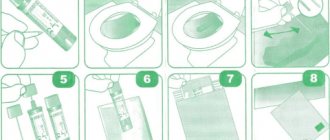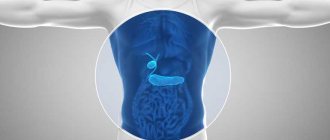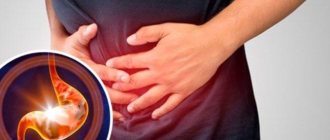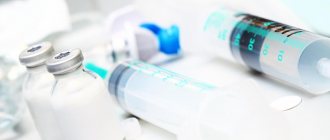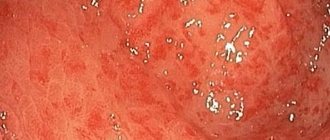FGDS
Gastroscopy (fibrogastroduodenoendoscopy, FGDS) is an analysis of the upper gastrointestinal tract (stomach, esophagus and duodenum) using a probe equipped with a camera. The doctor can see the condition of the mucous membranes directly during the procedure, and if necessary, takes pictures or video recordings from the camera.
The use of a gastroscope allows not only to make visual diagnostics, but also to take samples of the stomach contents and tissues, that is, to do a biopsy and pH measurements. We will consider a blood test for gastritis below.
Treatment of gastroduodenitis: medications, traditional medicine methods and diet features
Treatment of pathology largely depends on the results of the patient’s examination.
As a rule, complex treatment is required aimed at:
- restoration of the structure of the epithelial lining of the stomach and duodenum;
- restoration of secretory activity of the liver and pancreas;
- replenishment of deficiency of vitamins, minerals and amino acids;
- normalization of acidity levels.
So, when a Helicobacter pylori infection is detected, the following is prescribed:
- antiprotozoal drugs (Metronidazole, Trichopolum, Tinidazole), active against Helicobacter pylori;
- antibiotics (Klacid, Clarithromycin, Oxacillin, Flemoxin, etc.) complement the action of antiprotozoal agents and prevent the development of resistant forms of Helicobacter pylori.
In addition, treatment of chronic and acute gastroduodenitis includes:
- De-Nol (Ulkavis, Escape), preparations containing bismuth salts that envelop the walls of the digestive tract and protect them from the aggressive effects of gastric juice;
- Almagel, Rennie, Gastal, Maalox and other antacids are indicated for high acidity and neutralize the aggressive effects of gastric juice;
- Zantac, Quamatel, Famotidine and other medications belonging to the group of H2 blockers - histamine receptors, reduce the production of hydrochloric acid;
- Nolpaza, Lancid, Ontime, Omeprazole and other drugs of the class of proton pump inhibitors also inhibit the production of hydrochloric acid, but are better tolerated than H2 blockers - histamine receptors.
Gastroduodenitis with low acidity is much less common. For this disease, enzyme preparations (Mezim, Creon, Pangrol, natural gastric juice) are prescribed to normalize digestion. Both children and adults are required to be prescribed multivitamin complexes, medications containing iron and other supporting medications.
An integral component of the treatment of gastroduodenitis is diet. During an exacerbation, the patient should be given only pureed food, mucous soups, meat and fish soufflés, pates, omelettes and other dishes that do not irritate or injure the mucous membrane of the stomach and duodenum.
During the period of remission, the diet expands somewhat, but the following should be completely excluded:
- fried food;
- dishes prepared using various hot herbs and spices;
- fatty meats, poultry and fish;
- fatty sauces;
- animal fats;
- coarse fiber vegetables and fruits;
- concentrated meat and fish broths;
- alcohol;
- drinks containing caffeine;
- soda;
- snacks
To alleviate the symptoms of gastroduodenitis, you can also use the advice of traditional healers. For example:
- Pass 200 g of ordinary rowan fruits and aloe leaves through a meat grinder. Add 200 g of butter, goat milk, and honey to the resulting mass. Pour in half a liter of vodka. Leave in a cool, dark place for a week, strain and take a tablespoon an hour before meals.
- Mix oak bark and strawberry leaves in a 1:2 ratio. Pour a tablespoon of the mixture into a liter of cold water and leave overnight. Strain and drink the entire portion throughout the day.
- Pour 100 g of thyme herb with a liter of dry white wine. Leave for a week, then bring to a boil and leave in a warm place for 5 - 6 hours, strain. Take 30 ml half an hour before meals three times a day.
In general, if gastroduodenitis is treated correctly, the prognosis is favorable. In the vast majority of cases, it is possible to achieve stable remission, which can last for years if a strict diet is followed and medications are taken.
Many people are interested in the question of conscription into the army with a similar diagnosis. However, in this case it all depends on the symptoms. In case of exacerbation, a deferment is given; in other cases, the issue is resolved individually. Severe disease is a contraindication to military service.
The only way to prevent it is to follow a diet and follow the principles of proper nutrition.
https://youtube.com/watch?v=RyGln1s-6II
pH-metry
pH-metry consists of studying the acidity level of the stomach, duodenum, and esophagus. The acidity of the gastric contents gives grounds to judge the presence of inflammation.
Gastric juice is also examined using the probing method. Using special instruments built into the gastroscope, the doctor takes samples. Usually, before such a procedure, the patient is given “test breakfasts”, which stimulate the production of gastric juice. Analysis of its contents allows not only to establish the fact of gastritis, but partly to understand its nature: in a disease determined by Helicobacter pylori, a lot of gastrin is found in the gastric juice. What other tests are there for gastritis?
Probing of the stomach
Probing of the stomach is not permitted in case of organ stenosis and after surgery. In such cases, the level of acidity can be measured using an acid test: the patient takes special medications that, when interacting with hydrochloric acid in the stomach, form dyes present in the urine.
To diagnose gastritis caused by the bacteria Helicobacter pylori, several types of blood tests can be performed for gastritis: for antibodies to this bacterium, laboratory analysis of a biopsy or stool, as well as a respiratory test, when the patient first drinks juice in which carbamide (urea) has been dissolved and labeled carbon atom. Helicobacter pylori bacteria are capable of breaking down urea at a high rate, thereby increasing the release of carbon dioxide during exhalation. It is the study of its level in exhaled air that makes it possible to judge infection.
Come on, breathe!
After taking a biopsy, specialists must study the cells of the mucous membrane in the laboratory to detect the presence of Helicobacter pylori bacteria, which cause gastritis. However, these bacteria can also be detected using a special breath test. All that is required from the patient is to drink a glass of water (or orange juice) with a tasteless liquid dissolved in it (in medical parlance it is called 13 C-urea) and exhale into two special test tubes.
In the presence of the bacterium Helicobacter pylori, urea decomposes. This produces carbon dioxide. It is released through the lungs with expelled air. By the amount of exhaled carbon dioxide, which is captured by a special device, you can determine how many microbes inhabit the stomach. The analysis is painless and simple, the result is ready in 5 minutes.
To be more informative, it is better to carry out the test on an empty stomach or not eat for at least 3 hours before it. People whose family members suffer from diseases of the digestive tract must undergo it. In this case, the test can be carried out both at the first signs of gastritis and in the absence of symptoms. Despite its apparent simplicity, the survey is highly informative.
See also: Proper nutrition for gastritis →
X-ray
In the diagnosis of gastritis, the X-ray method is also used, but in terms of information content it ranks second after gastroscopy. The patient should not eat food for twelve hours, and in order to take an x-ray, he swallows a special contrast agent. After this, the doctor examines the stomach, changing the position of the patient’s body. X-ray examination can show the relief and tone of the organ, see the presence of ulcers, gastritis, and tumors. Gastritis is often indicated by characteristic changes in the mucous membrane, but in many cases a repeat procedure must be done to identify the permanent nature of such changes.
All of the above methods help diagnose chronic gastritis. The acute form at an early stage requires an initial examination of the patient and clarification of the medical history. Sometimes mucosal biopsy and FGDS are used to diagnose it. In children, tests, gastroscopy and ultrasound examination of the abdominal organs are used. If it is difficult to make a diagnosis, they take samples of the mucous membrane and gastric juice, do x-rays with a contrast agent, and pH measurements. Why might you need a general blood test for gastritis? More on this later.
Differential diagnosis of the disease
Acute gastritis has symptoms similar to a number of other diseases of organs located in the abdominal cavity (stomach ulcer, acute forms of cholecystitis and pancreatitis, myocardial infarction), infectious diseases accompanied by dyspepsia (meningitis, typhoid fever, scarlet fever).
For differential diagnosis of other diseases, a blood test for gastritis is necessary, the indicators of which allow us to obtain a more detailed history.
For example, in the presence of acute pancreatitis, patients complain of continuous severe abdominal pain and a general serious condition. An ulcer of the duodenum and stomach is characterized by periodic pain: after eating (every hour - maximum two), at night (on an empty stomach), exacerbation in such time periods as spring and autumn, relief after vomiting. Gastroscopy and x-ray examination also have a great effect in the differential diagnosis of gastritis and ulcers.
It is necessary to distinguish acute gastritis from myocardial infarction. With the latter, patients experience high blood pressure, angina, and severe pain in the sternum. In order to distinguish between these ailments, an electrocardiogram should be performed.
Different forms of chronic gastritis should be distinguished from ulcers and stomach cancer, atrophy of the gastric glands, irritable stomach syndrome, and decreased secretory function. To differentiate gastritis from a malignant tumor, multiple biopsies and x-rays must be performed.
Be carefull
Advanced gastritis (especially atrophic) is dangerous because it can degenerate into a malignant tumor.
Article on the topic Gastritis in children: risk factors, symptoms and treatment
It is believed that gastritis occurs due to a combination of at least two factors. The first - endogenous - is associated with our genetics and health. The development of the disease can be caused by functional disorders of the nervous system, endocrine diseases (diabetes mellitus, thyrotoxicosis, hypothyroidism), chronic deficiency of vitamin B12 and iron, renal failure, and allergies.
The second factor – exogenous – is associated with external circumstances. These include poor nutrition and regular overeating, stress, alcohol and nicotine abuse. And also - frequent use of medications (primarily non-steroidal anti-inflammatory drugs and antibiotics), contact with harmful substances: acids, alkalis, industrial dust.
If you have both endogenous and exogenous risk factors, you need to visit a gastroenterologist regularly and undergo examinations, even if your stomach never bothers you.
Article on the topic
How to prevent exacerbations of gastritis? Decoctions of nettle and sea buckthorn
What are the blood tests for gastritis?
The digestive system is one of the most significant in the body, therefore any disease related to it leads to disruptions in the functioning of the entire human body. Gastrointestinal ailments can leave traces of pathology in the blood. For this purpose, blood tests of several types are required.
- General analysis. It is carried out in a laboratory, and the material is taken from a finger. This analysis allows you to count the number of blood cells, determine their size, the level of bilirubin and hemoglobin, which is necessary for a correct diagnosis. The key point is to determine the rate at which red blood cells settle. It is well known that with gastritis, inflammatory processes develop in the stomach. Any inflammation leads to a change in ESR, and therefore such a study is mandatory.
- Biochemical blood test for gastritis of the stomach. Protein indicators, the presence of pepsinogens and their quantity are reflected in this study. If they are reduced, coupled with a high level of bile elements, it can be understood that gastritis developed against the background of a weakened immune system. Bilirubin and antibodies are also tested. If it turns out that the patient’s acid phosphatase is too active and there is an increased level of alpha-amylase, we can definitely talk about the development of pancreatitis. But a decrease in protein levels simultaneously with an increase in gamma globulin is characteristic of chronic autoimmune gastritis.
- Analysis for Helicobacter pylori. If a patient is suspected of having this bacterium, a blood test should be performed. To get a more accurate result, you need to not drink alcoholic beverages, tea or coffee, stop smoking, and abstain from food eight to nine hours before the test. Diagnosis is carried out to identify certain forms of immunoglobulin, which appear as protective forces designed to fight pathogenic agents. As a result, the body produces antibodies after three to four weeks, when the first signs of active activity of the microorganism are observed.
What is the blood test for gastritis of the stomach with erosions?
Blood test for erosive gastritis
With this type of gastritis, a blood test is performed and a hemoglobin test is studied.
The erosive type of gastritis is the most severe form, since serious complications can arise if it is not diagnosed in a timely manner. It is characterized by the development of repeated hidden bleeding. In case of illness, a blood test is performed to examine the hemoglobin sample. However, this does not apply to patients who frequently lose blood, since their hemoglobin level is constantly low. This happens with chronic gastritis. A blood test requires some preparation.
Preparing for analysis
This study is, without a doubt, the most high-quality way to detect the disease, since the result obtained allows us to confidently confirm the diagnosis. There are a number of reasons that influence the readings of the study: mental and physical fatigue suffered shortly before the analysis of the disease, heredity. If any of the listed phenomena is observed, you should immediately tell your doctor about it. Also, the day before the test, you need to stop eating junk food, coffee, tea, alcohol and smoking.
We looked in detail at how to take a general blood test for gastritis. The indicators are described.
Treatment of chronic gastritis
In the treatment of gastritis, much attention should be paid to lifestyle changes, try to avoid stress, follow a daily routine, get rid of bad habits (smoking, drinking alcohol), and of course follow dietary recommendations:
- For patients with gastritis, it is necessary to exclude fried foods, rich meat and fish broths, do not overeat, eat 5 - 6 times a day
- Do not consume foods that contribute to heartburn: strong tea, coffee, chocolate, carbonated drinks, alcohol, onion, garlic, butter
- Consume boiled meat, boiled fish, steamed food, pureed cereal soups (rolled oats, rice)
- Eat less cabbage, legumes, milk - foods that promote flatulence

